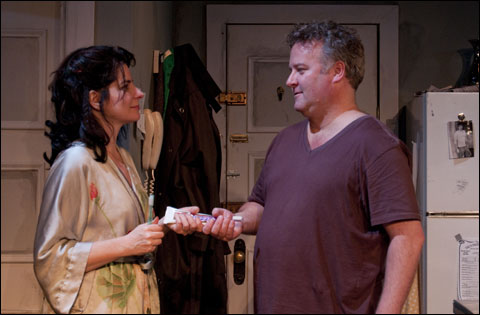
FRANKIE AND JOHNNY IN THE CLAIR DE LUNE Anne Gottlieb and Robert Pemberton make an especially believable — and wrenching — couple, warts and all. |
What could be more heartwarming for the holidays than a couple of middle-aged losers getting naked? New Repertory Theatre has sent its Scrooge on a school tour and decked its intimate downstairs Black Box with Terrence McNally's sentimental yet gritty Frankie and Johnny in the Clair de Lune (at the Arsenal Center for the Arts through December 19). The 1987 play — which originated Off Broadway and was watered down for a 1991 movie starring Al Pacino and Michelle Pfeiffer — is something between an arm wrestle and a pas de deux for two actors willing to let their hair down and their robes hang open.
Frankie and Johnny begins in a tangle of sheets and a gaggle of groans as the title twosome have what Meg Ryan is having (or faking) in When Harry Met Sally. Then comes the question E.M. Forster forgot to pop: after only connecting, then what? Puppyish short-order cook Johnny, who has just gotten lucky with waitress Frankie, wants to hold on tight and never let go. The heavier-carapaced Frankie wishes he'd go home to Brooklyn so she can snuggle up in her Hell's Kitchen studio with a tub of ice cream and the TV. The play was received in its debut as a metaphor for the toughness of intimacy in a time of AIDS — which Frankie refers to as people "dying from one another." But the work holds up, especially when it's the wrenchingly believable Anne Gottlieb and Robert Pemberton (who are married) doing the holding.
The collision of McNally's Frankie and Johnny, unlike that of their folkloric counterparts, is not fatal. But they are a warts-and-all pair, damaged emotional goods struggling with whether to mark themselves down and possibly get bought. For Frankie, who spends most nights staring sadly beyond the television at domestic violence in a neighboring building, Johnny's out-of-the-blue declarations of love qualify him as a "creep." Even their intense copulation, set to the rhythms of Bach's Goldberg Variations, strikes her as "harrowing." But the desperately open-hearted Johnny, who reads Shakespeare for the Bard's "little tips," sees this as his last chance to leap, and he's determined to get this closed-down woman clinging to the cliff of her distrust to jump with him. It makes for a post-coital back-and-forth as harrowing as the sex, and classical-music aficionado McNally puts an elegant cap on it by offering up Debussy as an aphrodisiac.
Practically in the lap of its small L-shaped audience, Antonio Ocampo-Guzman's production makes the most of this intimacy. Between Pemberton's exuberant performance and the tightness of the space, there are times when you understand Frankie's urge to be rid of her Johnny. And Gottlieb's Frankie counters his bull-in-a-china-shop romanticism not just with tough-talking wariness but also with a yearning barely hinted at in the script. Fine-tuned to the small space, the pair's performances are raw yet devoid of grandstanding, allowing Frankie and Johnny to transcend their hard-luck clichés and McNally's arguably precious use of music. Frankie and Johnny has at times seemed to me a long night's work. But I was glad to stick with these two, from midnight humping to tooth brushing by the dawn's early light.